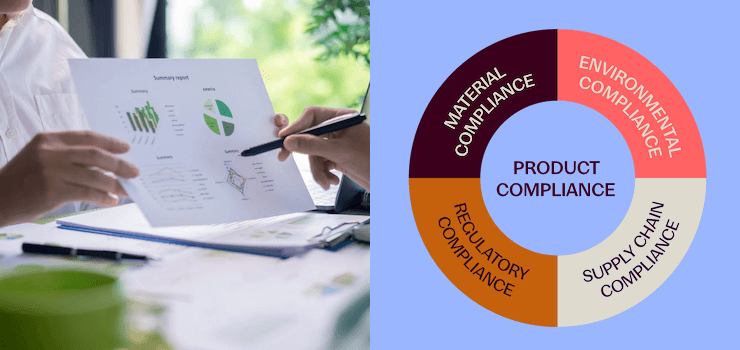The ECHA SCIP database increases transparency on hazardous substances in products. Under the EU Waste Framework Directive SCIP rules and in line with REACH Article 33 obligations, companies placing articles with SVHCs above 0.1% w/w on the EU market must submit a SCIP dossier. These obligations affect manufacturers, importers, and distributors across various industries – from electronics and automotive to consumer goods.
This article explains the purpose of the SCIP regulations, outlines reporting requirements, and shares best practices for efficient SCIP notification and SCIP reporting.
What is the ECHA SCIP Database?
The SCIP database (Substances of Concern in Articles as such or in Complex Objects (Products)) is operated by the European Chemicals Agency (ECHA). It collects and publishes information on articles containing Substances of Very High Concern (SVHC) above 0.1% w/w.
The database went live on January 5, 2021 and applies to all relevant articles placed on the EU market. Its main purpose is to increase transparency, support recycling processes, and improve waste management by making information on hazardous substances more accessible.
Submissions to the database must be made by manufacturers, importers, and distributors who place relevant articles on the EU market. This includes providing detailed product data, substance identifiers, and safe use information as part of a SCIP dossier in IUCLID format.
Legal Regulation and Framework: REACH, SVHCs, and the EU Waste Framework Directive
SCIP is rooted in two key EU legal frameworks: EU REACH regulation and the EU Waste Framework Directive (Directive (EU) 2018/851).
Under REACH Article 33, companies must inform downstream users when an article contains an SVHC above 0.1% w/w. This ensures that critical safety and handling information is passed along the supply chain.
The EU Waste Framework Directive builds on these communication duties by introducing a mandatory SCIP notification to the ECHA SCIP database. This means that, in addition to informing business partners, companies must submit detailed data to ECHA, including:
- Article identification and categorization
- Safe use instructions (where relevant)
- Identification, location, and concentration of SVHCs
The aim is to provide waste operators with reliable, product-specific data, enabling safer recycling processes and reducing the circulation of hazardous substances in the EU economy.
Who must comply?
- Manufacturers producing articles with SVHCs above 0.1% w/w
- Importers placing such articles on the EU market
- Distributors supplying them within the EU
Why it matters:
Non-compliance can lead to legal penalties, loss of EU market access, and reputational damage. For companies, meeting both REACH and SCIP requirements is essential to remain competitive and maintain trust with customers and supply chain partners.
SCIP Dossier Requirements
To comply with the SCIP regulation, companies must prepare and submit a SCIP dossier to the ECHA SCIP database in IUCLID format. This dossier must include:
- Article identification – description and categorization of the article or complex object, based on the ECHA’s harmonized list.
- SVHC information – identification of the substance of concern, its location within the article, and its concentration range.
- Material category – classification of the material or mixture containing the SVHC to support waste stream management.
- Safe use instructions – guidance for handling, recycling, or disposal, if necessary.
- Supplier and legal entity details – ensuring traceability within the supply chain.
Mandatory data fields: ECHA defines a mix of required and optional fields, but failure to complete mandatory sections will result in dossier rejection.
Free White Paper – SCIP Database Insights
Get an in-depth insight into SCIP database – What is required, and how you can get started.
Download SCIP Database White Paper
Challenges for Companies in SCIP Reporting
Complying with the SCIP regulation can be challenging, especially for companies with complex supply chains and high product volumes. The large amount of data required, combined with multiple data sources from suppliers and internal systems, makes the process resource-intensive.
Ensuring data quality is critical – incomplete or inaccurate information can lead to dossier rejection by the ECHA SCIP database, causing delays and additional work. Companies must also balance transparency with the protection of confidential business information, ensuring sensitive details are safeguarded while still meeting regulatory requirements.
Without efficient tools and processes, SCIP reporting can quickly become a costly and time-consuming obligation.
SCIP Reporting: Best Practices
Efficient SCIP reporting starts with a centralized data management platform that consolidates all relevant product, substance, and supplier information in one place. This ensures that data is complete, up to date, and ready for submission to the ECHA SCIP database using the required IUCLID format.
Implementing automated workflows for SCIP dossier creation, validation, and submission significantly reduces manual effort and the risk of errors. System-to-system integration with ERP, PLM, or IMDS platforms allows for seamless data exchange and ensures a single source of truth across the organization.
Free SCIP FAQ
Get the answers on the TOP 40 frequently asked questions
Case Insight: IPOINT’s Role in ECHA IT User Group

As an active member of the ECHA IT User Group, IPOINT contributes directly to the ongoing development of the SCIP database. Our experts provide input on usability improvements, interface design, and automation capabilities to make SCIP reporting more efficient for industry stakeholders.
This collaboration has played a key role in the creation of the IPOINT SCIP Connector – a practical SCIP solution designed for seamless integration with existing ERP, PLM, and IMDS systems. By enabling automated data exchange, bulk dossier submission, and validation in the required IUCLID format, the connector significantly reduces manual effort and minimizes reporting errors.
Through this work, IPOINT ensures that companies benefit from a future-ready platform that optimizes compliance processes and accelerates SCIP reporting efficiency.







